Hardliner Iran Students Demand Expulsion Of French Envoy Over Cartoons
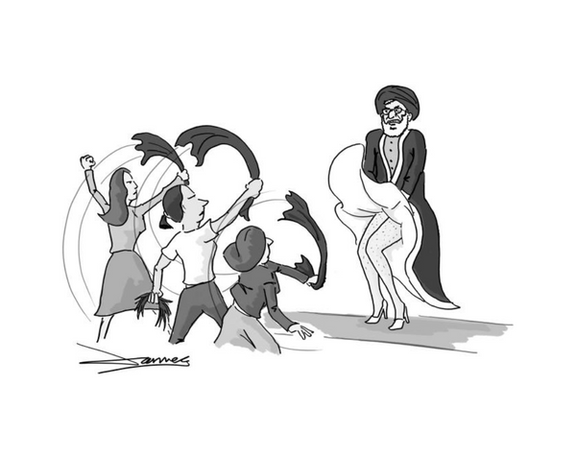
Hard-line student unions have called on Iran's foreign minister to expel the France's ambassador over “insulting cartoons” by French satirical magazine Charlie Hebdo.

Hard-line student unions have called on Iran's foreign minister to expel the France's ambassador over “insulting cartoons” by French satirical magazine Charlie Hebdo.
In a letter published by ISNA in Tehran on Sunday, the student unions called on the foreign ministry to take “the most serious action against the new insult supported by the Elysée against the people of Iran and Muslims of other countries.”
“Considering the history of Charlie Hebdo in insulting the sanctities of about 2 billion Muslims around the world, we expect the foreign ministry not to accept any excuses by the French government,” reads the letter.
The Iranian foreign ministry on Wednesday summoned France's envoy to Tehran to protest "insulting" cartoons depicting Supreme Leader Ayatollah Ali Khamenei published by Charlie Hebdo.
The magazine said the series was part of a competition it launched to support anti-regime demonstrations in Iran. France has said media in free and the government cannot interfere with what they publish.
Foreign ministry spokesman Nasser Kanaani said the publication of the cartoons was an "insult to authority, sanctities, and religious and national values" of Iran and the Islamic Republic does not accept these insults.
Charlie Hebdo has been the target of three terrorist attacks: in 2011, 2015, and 2020. All of them were presumed to be in response to several cartoons that it published controversially depicting Islam’s Prophet Muhammad. In the 2015 attack, 12 people were killed.
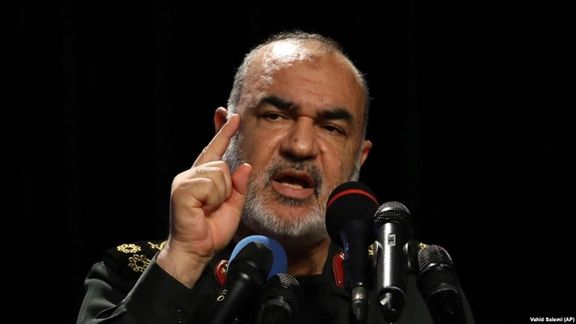
Iran’s hardliner commander of Revolutionary Guard has once again threatened the West to take revenge for the killing of former IRGC General Qassem Soleimani.
Major General Hossein Salami said Sunday during an event to commemorate Soleimani’s death that “sooner or later we will avenge his assassination.”
He claimed that no one can create problems for the Islamic Republic establishment, and addressing the West he said, “stop your miscalculations.”
Soleimani was in charge of supporting and organizing militant proxy forces, including the Lebanese Hezbollah and Iraq Shiite militia groups that were repeatedly attacking US forces in Iraq and eslewhere.
On Saturday, Iran’s Revolutionary Guard said retaliatory military attacks against US targets for the killing of Qassem Soleimani in 2020 are still viable options.
IRGC spokesman Ramazan Sharif was quoted by Iranian media as saying that “moves such as [the attack on] Ain al-Assad base [in Iraq] are still being considered and “will become operational in due time.”
Five days after Soleimani was killed by a US air strike on January 3, 2020, Iran fired ballistic missiles at the Iraqi base hosting US troops. No Americans were killed but reports at the time spoke of dozens of servicemen receiving concussion because of the strong explosions.
At the time, President Donald trump who ordered the killing said that Soleimani presented an imminent danger to US personnel and interests in the region.
Since then, the Islamic Republic has continued threatening revenge for Soleimani, and these threats were repeated during the third anniversary of his killing this week.
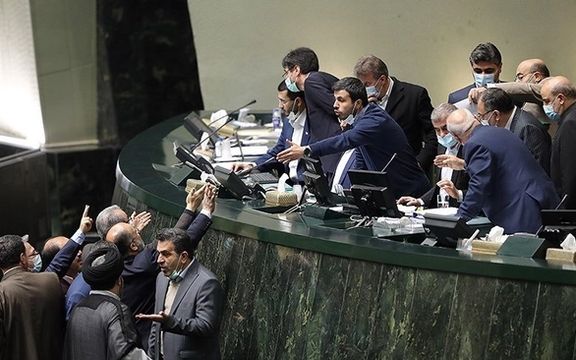
Amid protests and economic crisis, top conservatives in Tehran are maneuvering to present themselves as viable alternatives for the presidency and the parliament.
A commentary in the January 7 edition of the reformist daily Etemad said that leading conservative politicians in the government are distancing themselves from the Raisi administration. Other politicians outside the government have broken their silence as the weakness of a government dominated by hardliners is being revealed.
Etemad wrote on Saturday that the neo-conservative Majles Speaker Mohammad Bagher Ghalibaf and ultraconservative presidential adviser Saeed Jalili have been lately trying to define new roles for themselves in the next decade.
While some politicians may be planning for the next decade, reformist columnist Abbas Abdi told Eghtesad Online on January 5 that the continuation of the current situation in Iran for another two years is inconceivable unending antigovernment protests and Tehran's international isolation.
In the meantime, former proreform presidential candidate Mohsen Mehralizadeh has harshly criticized the Raisi administration for failing to stand by its promises and reiterated that Raisi is not an educated man and that he made promises because he is not familiar with political and economic concepts.

The Iranian media have interpreted all these developments as well as recent moves by former Majles Speaker Ali Larijani and remarks by former President Hassan Rouhani against the Raisi administration as attempts to prepare for next year's parliamentary and the 2025 presidential elections.
However, according to Etemad, Jalili's populist rhetoric against the 2015 nuclear agreement and a new deal with the West mark his dreams of establishing an even more hardliner administration. Etemad wrote that Jalili's denial of the looming threat of an international consensus against the Islamic Republic is part of his campaign for ultraconservative populist utopia.
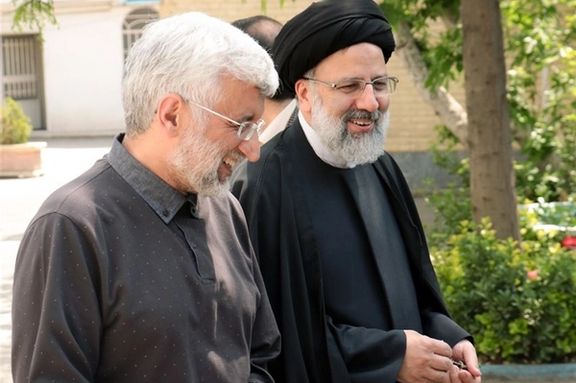
The daily added that Ghalibaf on the other hand has a dream of repeating former President Akbar Hashemi Rafsanjani's "reconstruction government". During the past weeks Ghalibaf has been talking about a new development-oriented governance, but his occasional support for suppression of protesters contradicts his agenda. Nonetheless, since the protests started in mid-September, Ghalibaf has been repeating his keywords of "neo-conservatism" and "new governance" in a bid to create his political brand ahead of the next elections in Iran.
Ghalibaf also went to Qom and met with Iran's top clerics who in his support criticized Raisi's economic policies.
Ghalibaf has been often complaining about the refusal of many conservatives to support him in the past presidential elections although all the polls showed he was in a better position than the main conservative contestant particularly in 2013 and 2017.
At the same time, while Iran's reformists seem to have little hope for a political comeback, moderate conservatives such as Rouhani and Larijani find themselves in a better position to compete with the ruling ultraconservatives and are making some moves.
Standing in the middle, Mehralizadeh, who has never been accepted by the public as a reformist or by the government as a conservative, has come up with a new tactic. He says a political party, The Nation's Path Party, has written to him and asked to stand as a candidate in the next election. As a response, Mehralizadeh has once again challenged Raisi's academic and political credentials and pointed out that the most important threat against the Islamic Republic is "the fire of anger and revenge" resulting from violent treatment of the protests and advised the government to "speak softly to the nation."
While all these figures are talking about the continuation of the Islamic Republic, protesters in Iran do not seem to settle for anything other than a regime change and executions that shook Iran Saturday, do not seem to change this.
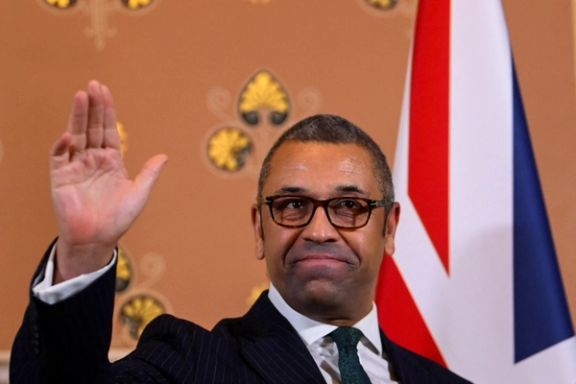
The United Kingdom has slammed Iran's execution of two protesters Saturday and urged the regime to "immediately end the violence against its own people".
The country’s Foreign Minister James Cleverly in a tweet said, "The execution of Mohammad Mahdi Karami and Seyed Mohammad Hosseini by the Iranian regime is abhorrent."
"The UK is strongly opposed to the death penalty in all circumstances," he added.
Iran hanged the two men for allegedly killing a member of the security forces during nationwide protests that were triggered following the death of 22-year-old Kurdish woman Mahsa Amini in police custody in September.
The convictions were not based on a criminal charge related to the murder per se, but they were charged with ‘moharebeh’, meaning “war against God”, a vague religious concept. The Islamic Republic applies the charge to people who might get into a confrontation with security forces during protests.
Despite widespread international attempts to stop the executions, the regime decided to implement the verdict reached in November. Officials say death sentences for three others in the same case have been canceled.
So far, the government has executed four protesters and nearly a dozen others have received the death penalty, some for much less charges than murder, while at least 100 protesters face charges that could end in death sentences for them, an Iranian human rights group based in Oslo has reported.
Dozens of prisoners are either on hunger strike or suffer from life-threatening illnesses that are not treated by prison authorities and some are deprived of life-saving medications.
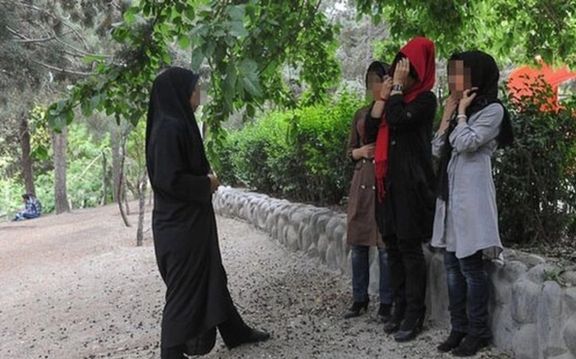
Right when many say the Islamic Republic is showing signs of revisionism about mandatory hijab rules, the regime announces new methods to enforce them.
Following an ambivalent speech by Supreme Leader Ali Khamenei earlier this week, stopping short of clearly setting out a policy regarding the enforcement of hijab, Parliament Speaker Mohammad Bagher Ghalibaf (Qalibaf) criticized the police over their harsh treatment of women with loose hijab.
Describing hijab as the inevitable duty for all Muslim women, at the same time Khamenei had emphasized that no Iranian woman should be labeled as non-religious or anti-revolutionary if she fails to fully honor the Islamic dress code.
During a TV program that aired January 5, Ghalibaf said "What right do we have to say that we don't let a woman ride the subway when she is not wearing hijab properly?"
Describing the issue as polarizing, he said that both extremes of no Islamic dress code and harassing women for hijab “benefit the enemies.”
Signaling a sign of retreat, Ahmad Alamolhoda, a senior firebrand cleric who is President Ebrahim Raisi's father-in-law, said earlier in the week that people cannot be forced to adopt the culture of wearing hijab. It is certain that police measures will not do job because it is not possible to teach people what is right just by harsh and negative actions, he said, noting that it is not possible to make hijab a culture with threats and arrests, there should be a clear and comprehensive plan for that.
Last year in March, the staunch hardliner had urged people to reproach women with poorly-fitting hijab to stop “debauchery.” “If a woman in the street removes her headscarf, she must face the complaints of the people to see that she has no place…In such a case, you can be sure that she will wear even two scarves."
The hardliner cleric's apparent retreat from his harsh position seemed to come after Khamenei sounded a bit more lenient about those who are not observing hijab according to the ideals of the regime.
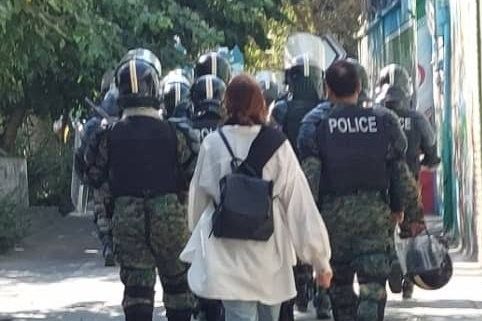
It was forcible enforcement of hijab in the streets that triggered popular protests in September -- the boldest challenge the Islamic Republic has ever faced.
The Islamic Republic faces a dilemma: Allowing people to wear whatever they desire in public means the utmost failure of the regime's ideology, while enforcing hijab with strict punitive measures can only lead to further resentment in society. Now, the three branches of the Islamic Republic’s government are mulling over new methods to enforce hijab.
Reformist Shargh Daily said Thursday that new measures include banning those who unveil from leaving the country, imposing fines, denying employment, and community service as well as restrictions on using public services.
Apparently, these are parts of the measures that the parliament is considering for hijab enforcement.
On January 1, Fars news agency, affiliated with the hardliners and the IRGC, cited an unnamed police source as saying that a new phase of a plan to enforce hijab has started across the country. The news agency also confirmed reports that many people had received warnings via SMS about removing hijab in their cars.
Defending the decision, Interior Minister Ahmad Vahidi told Rouydad24 website Friday that “Observance of hijab is a legal issue and one of our religious values. Most of our women also observe this issue.”
A lawmaker said in December that the regime is making some decisions about hijab rules, explaining that the methods for enforcing hijab may change. He added “it is possible that women who do not observe hijab would be informed via SMS, asking them to respect the law. After notifying them, we enter the warning stage... and last, the bank account of the person who unveiled may be blocked."

New figures show that due to extensive internet and social network restrictions, 20 percent of people in Iran have lost their online jobs in the past four months.
According to Jobvision website, the restriction imposed on Iranians’ access to social networks following nationwide protests has resulted in a series of undesirable consequences such as cutbacks, increased uncertainty about the future, reduced salaries, and the suspension of development plans.
The website published a chart showing that 46 percent of organizations have suspended or postponed more than half of their recruitment programs due to the recent internet restrictions.
45% of companies or businesses that depend on the Internet have decided to reduce their payments or had to pay wages by delay.
The statistical findings of Jobvision show one out of every five people have lost their jobs, and 16% of those working in this area expect to be fired soon.
Restrictions on Instagram has had a deep impact on the lives of people who used to make a living on this popular social network.
The government often shuts of slows down access to the Internet and social media platforms, while President Ebrahim Raisi promised in his election campaign that he would not block Instagram because "it is the place of business for many Iranians".
Since the beginning of nationwide protests almost four months ago, the government has cracked down on protests violently, and officials have repeatedly blamed cyberspace and foreign media for provoking the protesters.